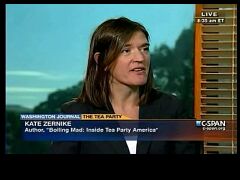Tea Party Book Author Zernike: Tea Party All About 'Us vs. Them' (Poor, Blacks, Illegals, etc.)
Kate Zernike, Times reporter and author of "Boiling Mad," appeared on C-SPAN's "Washington Journal" September 10 to discuss her book. Around fourteen minutes in, a caller argued that the 1968 campaign for president of Southern segregationist governor George Wallace marked the real roots of the Tea Party movement. Zernike agreed, skipping over concerns about encroaching government and big spending while adding that in the movement there is a feeling of "Us vs. them," with "them" being the poor, blacks, and illegal immigrants.

Kate Zernike: "Thanks for calling. Actually, you will see, you will find a chapter in my book that does goes into the history and actually starts earlier in 1964 with the Goldwater campaign and I think it does lead into Wallace. But I do have a chapter in the book about the history of the Tea Party movement and as I said earlier, we do see roots of this not only in the George Wallace campaign but also in the tax revolts of the seventies and late, and the early-eighties."
C-SPAN Host Susan Swain: "But when Wallace comes into the picture, what overtone does that bring to their stance, I mean that's where you get...?"
Zernike: "Absolutely, that's where you get the race question coming in. And I think, I think, there is, I think whenever, and this is why people again have trouble separating race and the Tea Party movement, because there is this feeling of, 'We want to keep ours,' and there is very much an 'Us vs. Them,' and when you talk about 'them,' it always brings up, 'the them' are the poor, the disadvantaged, blacks, etc. And now I would say illegal immigrants as well."


